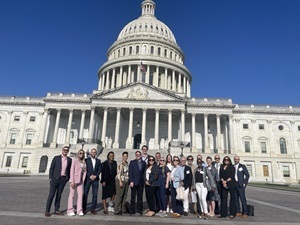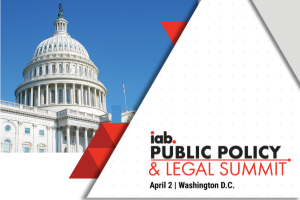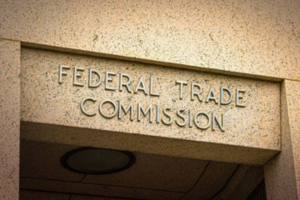
American Privacy Rights Act: Wrong Solution to Data Privacy

The U.S. needs a national data privacy law to simplify a complicated patchwork of state laws. One study estimates 10-year compliance costs of conflicting state laws at over $1 trillion. National privacy legislation must also avoid the mistakes of California and the EU. Another study by the state of California estimates compliance costs for the California Consumer Privacy Act (CCPA) at $58 billion, nearly 2% of the state’s economy.
The EU’s General Data Protection Regulation (GDPR) has depressed innovation, jobs and growth across Europe, confusing consumers and tech experts alike with endless pop-ups, opt-ins, and bureaucratic jargon. Yet Congress is barreling down the same path with the American Privacy Rights Act (APRA), a bill modeled on GDPR – which some argue is merely economic protectionism – that could be much worse. It could exacerbate the patchwork of state laws and create serious problems for consumers.
Rather than attempt to emulate or out-do or punitive foreign regulations, Congress should provide businesses and consumers with clear responsibilities and rights, and protect innovation, competition, and opportunity for all Americans. Missing from discussions of APRA in Congress, however, has been any mention of digital advertising’s benefits to our economy or society or APRA’s potential negative consequences.
IAB has raised our concerns to the House Energy and Commerce Committee overseeing the bill. As currently drafted, APRA fails to fully preempt state laws, creates a “private right of action” leading to a flood of lawsuits, duplicates enforcement and penalties at the state and federal level, and restricts ordinary customer data and advertising methods. As one researcher notes in the case of GDPR, less data means lower quality products and services for consumers.
Internet for Growth, a nationwide small business coalition, warns that APRA, intended to punish a few big companies, would only make Big Tech bigger, just as GDPR has empowered the powerful in Europe. Bigger companies have been able to withstand the regulatory onslaught, while smaller ones and consumers have fewer opportunities.
IAB supports data security and transparency, so consumers feel safe online and can make informed choices. We also support digital advertising’s irreplaceable role in our economy and society and are urging policymakers to make major changes to APRA.
Related Coverage:
American Privacy Rights Act Strikes Fear in Internet Ad Industry (AdAge)
IAB Urges Major Changes to Federal Privacy Bill (Digiday)
Internet for Growth Grows Influence

The timing could not have been better for National Small Business Week in May, when Internet for Growth members from around the country traveled to Washington, D.C., to promote digital advertising and oppose anti-advertising provisions in APRA, which legislators introduced in April this year. IAB also hosted several small businesses. Retailers, restaurateurs, realtors, and others from as far as California and Colorado visited dozens of congressional offices to warn staff about the bill speeding through Congress.
Internet for Growth members, numbering over 2,000 nationwide, are contacting their local media outlets to spread the word. Ben Footh of Footh Auto Sales appeared on Minneapolis TV to share his success story, thanks to digital advertising, and to explain why a national data privacy law should help to level the playing field for small businesses competing against big companies. Jake Kranz, owner of Uncle Charlie sports marketing, explains in his hometown newspaper that a “tech lash” in Washington, D.C., could raise barriers for entrepreneurs and decrease choices for consumers, all of whom save time and money with the help of digital advertising.
Thousands of letters from their constituents are pouring into congressional offices, raising awareness of digital advertising issues affecting all of us. You can join Internet for Growth’s effort here and email [email protected] to get more involved in this critical campaign for our industry.
Related Coverage:
Digital Ad Policy in Washington Bad for Business (Colorado Politics)
Data-Driven Digital Advertising is Crucial to Entrepreneurs and Under Threat (Entrepreneur)
IAB Public Policy and Legal Summit Attracts Attention

As small businesses flock to Capitol Hill to engage policymakers, IAB is also engaging government and industry leaders at events like our Public Policy and Legal Summit, which took place just blocks from the White House this spring. IAB Tech Lab was there, along with hundreds of IAB members across the spectrum, including brands and publishers, ad tech firms and media platforms, discussing the hottest topics in Washington, D.C., and state capitals.
In addition to multiplying state privacy laws, a federal one, and President Biden’s AI executive order, expert panels explored how to build a privacy-centered tech stack, align cross-functional privacy teams, and legal strategies to counter cookie-related litigation. Michael Macko, chief enforcer at the California Privacy Protection Agency, made news with a data minimization advisory for businesses collecting and retaining consumer data.
IAB hosted special guests from the National Telecommunications and Information Administration (NTIA), Senate Majority Leader Chuck Schumer’s office, the Federal Trade Commission (FTC), and leading companies across IAB’s membership. Next year’s event will be even better. Check your inbox for the latest invitations and announcements from our Public Policy Team in D.C.
Related Coverage:
The California Privacy Protection Agency Is ‘Primed And Ready’ For Enforcement (AdExchanger)
How Marketers Can Navigate the Legal Pitfalls of Generative AI (Marketing Dive)
Nullifying New Negative Option Rules

Similar to some bills in Congress, proposed FTC rules paint digital advertising in a dark light, but our industry is an economic bright spot. Every year, efficient, affordable digital advertising represents a larger share of the advertising market, providing opportunities for creativity and commerce. The digital subscription market is growing too. According to Statista, the market will double in value in just a few years.
So, when the FTC announced major changes to online subscription rules, IAB leaped into action. In a public filing, we warned that, instead of helping consumers, so-called “negative option” rules for automatically renewing services would burden consumers with legalese, slow service, raise prices, and probably violate the First Amendment. Forbidding companies from offering customers better deals would be both costly and unconstitutional, we argued.
Because the FTC failed to conduct an accurate cost-benefit analysis, IAB requested and received a series of public hearings to investigate. An administrative law judge recently ruled in our favor that the FTC’s new rules would cost far more than $100 million, a legal threshold requiring further study. Despite the ruling, the FTC is forging ahead. However, IAB and our partners are in a stronger position to influence a better outcome.
Related Coverage:
Judge Suggests New FTC ‘Click To Cancel’ Study (MediaPost)
Industry Groups Criticize Negative Option Rule (Legal Dive)
Advocating for Kids Online Safety

The FTC has been aggressively pursuing new regulations for the online economy, with a particular focus on children’s privacy. IAB is dedicated to protecting kids online, offering guidance to our members. However, a proposed update to the FTC’s Children’s Online Privacy Protection Rule could ban popular website features like photo-sharing, screen names, and avatars without providing meaningful privacy protections.
In fact, new rules could require excessive data collection to verify users’ ages, relying on unreliable sources like user reviews. This approach risks weakening the “actual knowledge” standard that currently protects companies from liability and could subject general audience websites to the same stringent standards as those designed for children, disrupting the online experience for everyone.
In our public comment to the FTC in March, IAB emphasized the importance of preserving the “actual knowledge” standard. Additionally, the FTC should maintain an “internal operations exemption” for data collection and analysis that supports essential functions, such as fraud detection, product improvement, and payment and delivery processes. Protecting children online is important. So is protecting access to beneficial, affordable, ad-supported content and services helping children to learn, play and communicate.
We have delivered that message to Congress as well, joining other leading trade associations to support stronger privacy and free speech protections in the Kids Online Safety Act (KOSA).
More IAB Public Policy News:
Kids Safety Bill Moves Forward In House (MediaPost)
“Next in Media” Podcast Features IAB’s Lartease Tiffith on Anti-Advertising Policy in Washington, D.C.(Next in Media)
Proposed Data Broker Regulations Draw Industry Pushback (CyberScoop)



